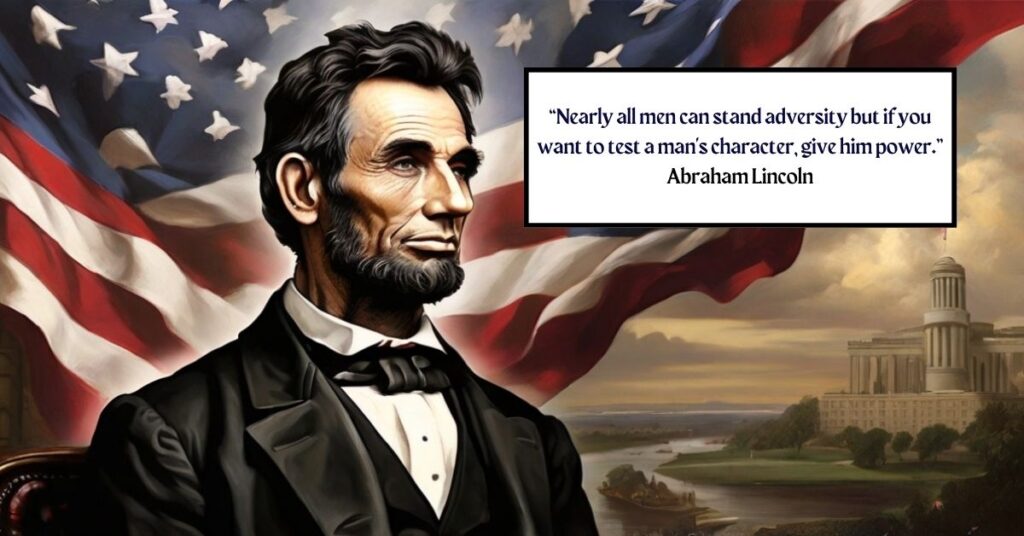Abraham Lincoln, the 16th President of the United States, is revered as one of the greatest leaders in American history. The life of Abraham Lincoln is a fascinating subject, encompassing his early years to his tenure as the President, and the impact he had on the United States.
His legacy, shaped by his role in preserving the Union during the Civil War and his commitment to emancipating enslaved individuals, continues to inspire generations around the world.
Early Life
Born in a humble log cabin in Kentucky on February 12 1809, Abraham Lincoln’s early years were marked by hardship and adversity. Raised in a log cabin on the frontier, Lincoln experienced the challenges of poverty and frontier life from a young age. He lost his mother at a young age and had limited formal education.
Despite his humble beginnings, Lincoln was instilled with a strong work ethic and a thirst for knowledge by his parents, Thomas and Nancy Lincoln. His limited formal education did not hinder his intellectual growth, as he devoured books and sought out mentors who could help him expand his horizons.
Career Before Presidency
After moving to Illinois in 1830, Lincoln embarked on a career in law and politics. His reputation as a skilled lawyer quickly grew, and he soon became known for his honesty, integrity, and commitment to justice. In 1834, Lincoln was elected to the Illinois State Legislature, marking the beginning of his political career. Over the years, he rose through the ranks of the Whig Party and served a term in the U.S. House of Representatives from 1847 to 1849.
Presidency and the Civil War
Lincoln’s election as President in 1860 came at a time of great turmoil and division in the United States. With the nation on the brink of Civil War, Lincoln faced the challenge of preserving the Union and navigating the challenges of wartime leadership. Throughout the conflict, Lincoln demonstrated extraordinary resolve and determination, guiding the nation through its darkest hour with courage and conviction.
Emancipation Proclamation
One of Lincoln’s most significant acts as President was the issuance of the Emancipation Proclamation in 1863. This historic document declared all slaves in Confederate-held territory to be free, signaling a profound shift in the nation’s moral and political landscape. While the proclamation did not immediately end slavery, it represented a turning point in the war and paved the way for the eventual abolition of slavery with the passage of the 13th Amendment.
Gettysburg Address
Another defining moment of Lincoln’s presidency was his Gettysburg Address, delivered in November 1863 at the dedication of the Gettysburg National Cemetery. In his brief but powerful speech, Lincoln eloquently articulated the principles of democracy and equality, reminding the nation of the sacrifices made by those who fought and died on the battlefield.
Death
Tragically, Lincoln’s life was cut short by an assassin’s bullet on April 14, 1865, while attending the play Our American Cousin at Ford’s Theatre in Washington, D.C. , just days after the Confederate surrender at Appomattox Court House. His death sent shockwaves across the nation and plunged the country into mourning. Yet, Lincoln’s legacy endures, a testament to his enduring impact on American history and ideals.
Legacy of Abraham Lincoln
Abraham Lincoln’s legacy is one of courage, compassion, and commitment to justice. His leadership during one of the darkest periods in American history serves as a beacon of hope and inspiration for generations to come. His rise from obscurity to Presidency is a testament to the power of determination, integrity, and unwavering leadership, he possessed.
As we reflect on the life and legacy of Abraham Lincoln, we are reminded of the enduring power of leadership and the ability of individuals to shape the course of history. Lincoln’s commitment to justice, equality, and the preservation of the Union continues to inspire us today, serving as a reminder of the values that unite us as a nation. Let us honor his memory by striving to uphold these ideals in our own lives, and by working towards a future that reflects the principles for which Lincoln so passionately fought.
Read about the oldest cities in the world here.

